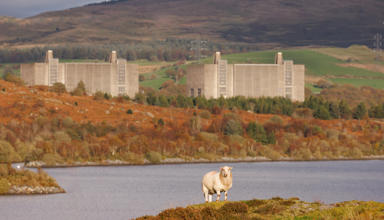On Monday 29th April, the Minister for Environment, Energy and Rural Affairs, Lesley Griffiths AM declared a climate emergency in Wales. The announcement aims to highlight the significance of the recent climate change protests and the evidence from the Intergovernmental Panel on Climate Change (IPCC) Special Report on the impacts of global warming of 1.5°C.
The latest UK Climate Change Committee (UK CCC) Reducing UK Emissions Progress Report to Parliament found that Welsh emissions in 2016 had fallen by 14% in comparison to 1990. However, emissions have been rising gradually at an average rate of 1.4% per year, with a 5% increase in 2016. This is largely due to slight increases in a number of sectors, such as agriculture, non-residential and residential buildings and transport. The current target for 2050 is a reduction in all greenhouse gases by 80% (relative to 1990) with interim targets of a 27% reduction by 2020, 45% by 2030, and 67% by 2040.
There is no official definition of a climate emergency, but many areas declaring this are aiming to be carbon-neutral by 2030. The declaration by the Welsh Government follows a declaration of climate emergency made by the Scottish First Minister, Nicola Sturgeon at a Scottish National Party conference on Sunday 28th April. On Wednesday 1st May, the UK Parliament also approved a motion declaring a climate emergency. The declaration follows the increased pressure on governments from climate change activist Greta Thunberg, the school strikes for climate and Extinction Rebellion movements.
In the written statement on the declaration, the Minister for Environment, Energy and Rural Affairs, Lesley Griffiths AM explained that:
‘…Welsh Government will not allow the process of leaving the EU to distract us from the challenge of climate change, which threatens our health, economy, infrastructure and our natural environment.’
As described in the statement, the Welsh Government has sought advice from the UK CCC on its options for setting net-zero targets for greenhouse gas emissions. The UK CCC have since advised that Wales should now aim for a 95% reduction in emissions by 2050 relative to 1990. Achieving this will require both UK-wide and devolved policies.
The written statement includes current and future actions by the Welsh Government that aim to tackle climate change:
- Publication of Prosperity for All: A Low Carbon Wales, which sets out 100 policies and proposals to meet the 2020 carbon emissions targets;
- Emphasis on unifying communities, workers, businesses and government to create all-Wales solutions;
- Supporting and funding community-led renewable energy projects from Welsh Government Energy Service;
- Supporting the establishment of the Centre for Climate Change Transformations at Cardiff University;
- Establishing an Industry-led Decarbonisation group, focusing on sectors that will be challenging to decarbonise; and
- Creating a Climate Just Advisory Group, aiming to protect communities relying on employment in carbon-intensive industries.
On Wednesday 1st May, the National Assembly debated a motion on climate change in Plenary. Following the declaration from the Welsh Government two days before, many Members expressed their agreement with the need for a declaration of emergency, but some felt that the Government’s plans did not go far enough, urging it to ensure that the declaration was not just ‘grandstanding’. Some Members wanted clarification of what will be done to achieve the promises made, and urged they be backed by significant action, ambitious targets, and not just a ‘business as usual’ approach.
Declaration of a Climate Emergency Across Wales
Prior to the declaration from the Welsh Government, local councils across Wales were declaring their own climate emergencies. The first declaration in Wales came from Machynlleth Town Council on 17th December 2018, following a signed letter from residents, urging the council, among other things, to: declare a climate emergency, call on both the Welsh and UK Governments to provide support in implementing this.
Since then, declarations have been widespread, from Cyngor Gwynedd, to Carmarthenshire, to Cardiff, a total of ten councils so far across Wales. The declarations have been varied, with Newport Town Council stating it will:
‘…take steps to raise awareness in Newport, and will endeavour to mitigate its own environmental impact.’
Among other council pledges, is to support the implementation of the Welsh Government’s low carbon delivery plan, Prosperity for All: A Low Carbon Wales.
Prosperity for All: A Low Carbon Wales
The Welsh Government published its first low carbon delivery plan, Prosperity for All: A Low Carbon Wales, in March 2019. The delivery plan (a requirement under the Environment (Wales) Act 2016) sets out how Wales aims to meet its first carbon budget (2016-2020) and consequently its 2020 interim emissions reduction target. It does this through 76 existing policies from across Welsh Government, UK Government and the EU – and 24 new proposals.
The plan sets out the Welsh Government’s vision for a low carbon Wales; its cross-government approach; sector emissions pathways and ambition for power, buildings, transport, industry, land-use, agriculture, waste and f-gases.
Greta Thunberg and the School Strike for Climate Movement
In August 2018, then-15-year-old Greta Thunberg protested outside of the Swedish Parliament, Riksdag, with a sign saying: ‘Skolstrejk för klimatet’ (‘School strike for climate’). Greta demanded that Swedish Government reduce its carbon emissions to align with the Paris Agreement. The School Strike for Climate movement was sparked by Greta’s protesting and gained worldwide attention following the UN Climate Change Conference (COP24) in December 2018.
On Friday 15th March 2019, this movement led around 1.4 million students across the world to go on strike in protest of the way governments are tackling climate change. Recently, Greta visited the UK and delivered a speech to MPs challenging the UK government on the calculations of its carbon emissions and urged it to ‘start treating the crisis like a crisis – and act even if we don’t have all the solutions.’
Extinction Rebellion Movement
Concurrently with these strikes, the Extinction Rebellion movement was gaining traction. On Wednesday 31st October 2018 the group met at Parliament Square in London and announced a Declaration of Rebellion against the UK Government. Since then, the movement has gathered members from all over the UK and internationally, and on Monday 15th April, began protesting in multiple locations across London. For the UK, the demands of the movement include declaring a climate emergency and reducing greenhouse gas emissions to net zero by 2025, in addition to other topics.
On Sunday 21st April, Greta Thunberg joined protestors from Extinction Rebellion in London to encourage their activism to continue.
Article by Holly Tipper, Senedd Research, National Assembly for Wales
Senedd Research acknowledges the parliamentary fellowship provided to Holly Tipper by the Natural Environment Research Council which enabled this article to be completed.






